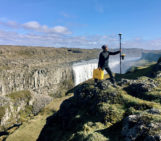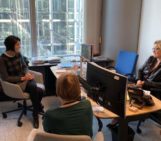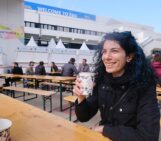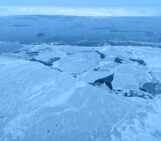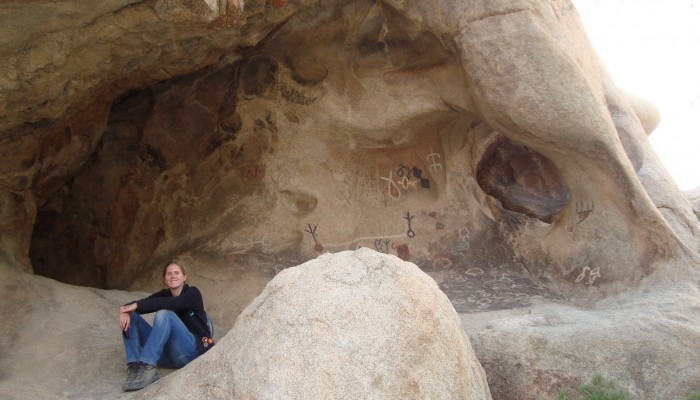
In addition to the usual GeoTalk interviews, where we highlight the work and achievements of early career researchers, over the next few months we’ll be introducing the Division early career scientist representatives (ECS). They are responsible for ensuring that the voice of EGU ECS membership is heard. From organising short courses during the General Assembly, through to running Division Blogs and attending regular ECS representative meetings, their tasks in this role are varied. Their role is entirely voluntary and they are all active members of their research community, so we’ll also be touching on their scientific work during the interview. Today we are talking to Anne Pluymakers, ECS representative for the Tectonics and Structural Geology Division (TS).
Before we get stuck in, could you introduce yourself and tell us a little more about yourself and your career?
I am Anne Pluymakers, and my background is in Geomechanics and Structural Geology. I defended my PhD last March at the HPT lab at Utrecht University in the Netherlands. During my PhD I performed experiments to determine the effects of CO2 on the frictional and healing behaviour of faults, at pressure and temperature conditions representative for potential CO2 storage sites. Since January I work as a post-doc at Oslo University investigating CO2-shale interactions, which forms part of an international combined CO2 storage/enhanced gas recovery research project. As these project descriptions also demonstrate, it is the combination of science and societal challenges that captivates me.
Although we touch upon it in the introduction of this post: what does your role as ECS representative involve?
As an ECS representative I think it is important to help Early Career Scientists discover what they want achieve, during their PhD but also in their future careers. I feel it is good to start thinking about where you want to go early on, and to try to acquire the necessary skill set that will help you get there. Apart from that, with our TS ECS organising committee we will organise activities that involve people further in EGU and its organisation, as well as try to help people develop such skill sets.
Why did you put yourself forward for the role?
It sounded like an interesting role to take, and a good way to increase my understanding of EGU as an organisation and a community. Besides that, I love organising things and talking to new people and this is a great way to do just that.
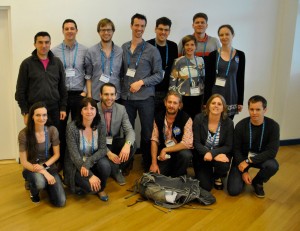
Some of the ECS Representatives at the 2014 General Assembly in Vienna. Top, from left to right, (in brackets, the Division they represent) : Matthew Agius (SM), Shaun Harrigan (HS), Wouter Berghuijs (ECS Representative), Roelof Rietbroek (G), Matthias Vanmaercke (SSS), Auguste Gires (NP), Nanna B. Karlsson (CR), Bottom (left to right): Ina Plesa (GD), Lena Noack (PS and Deputy Union Level ECS PC Representative), Sam Illingworth (ECS PC Representative , 2013- 2015), Guilhem Douillet (SSP), Anne Pluymakers (TS), Jone Peter (stand-in for Beate Krøvel Humberset, ST).
What is your vision for the EGU ECS TS community and what do you hope to achieve in the time you hold the position?
I would love to increase the community feeling of all the Early Career Scientists that feel affinity with Tectonics and Structural Geology, and to strengthen the TS network. I think it is important as well to make it easier for the new Early Career Scientists to connect to the existing network.
What can your ECS Division members expect from the TS Division in the 2016 General Assembly?
We have several ideas, amongst which EGU-wide workshops such as a grant writing workshop, and a first-timers workshop. These will be organized in conjunction with the other ECS. Oriented specifically towards our TS community, we will organize a dinner and pub night early on in the conference, so we all can get to know as many people as possible. Later on there will also be a feedback session for all TS-affine ECS to see how we can keep on improving.
How can those wanting to, get involved with the EGU?
If you would like to get in touch with the ECS of the TS Division, and possibly help organise activities, please send an email to me, or to João Duarte.
To find out about all the early career events and activities at the General Assembly and throughout the year be sure to check the dedicated ECS website. There, you’ll also be able to find out who you’re Division ECS representative is, if you’d like to get in touch with them and become involved in the Union. The website also hosts a page full of useful resources for career development as well as a database of undergraduate and postgraduate courses spanning the geosciences across Europe.

